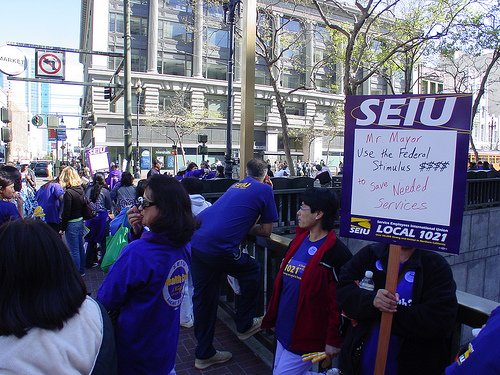Res Judicata: I Want To Sue the Teamsters

Last year I moved my law firm from one high-rise building in downtown Chicago to another one a few blocks away. Because the move was a short one, I shopped around for a mover who could get the job done for under $500. And there were small movers in the suburbs willing to do the job at that cost.
Yet I discovered a problem when I attempted to obtain permission from my new landlord for the suburban mover to use the loading dock. The mover was non-union, and the building would not allow any non-union contractor or subcontractor into the building.
I checked my lease to see if there was any such restriction on my ability to hire independent contractors of my choosing. And sure enough, there was. The lease requires tenants to obtain permission from management for any independent contractor.
It does not expressly provide that such permission shall only be given to unionized contractors, but the building manager made it quite clear to me that indeed was the unwritten policy. If someone tries to bring in a non-union electrician, the building owner will order the electrician to leave, and if that doesn’t work, the building staff will walk off their jobs, effectively shutting the 40 story structure down.
So the building is colluding with the union to keep out non-union workers even though the result of that conspiracy is to jack up the price of labor for the building’s tenants. Why would the building agree to enforce this rule? At first blush, it would seem not to be in the building’s interests. It wants to keep its tenants happy.
The reason is big cities operate under union control. Union members tend to live in these cities. They are rewarded with vastly supra-competitive (overpriced) wages in exchange for which they pay hefty union dues. These dues flow to politicians who pressure big businesses to pay extortionate wage rates in exchange for barriers to competition. So a big employer in Chicago’s Loop will have to pay enormous labor costs, $30-70/hour for contractors plus generous benefits, but the City will steer contracts to that company. Additionally, sky-high labor costs keep out competitors. So big landlords and big construction firms and big hotel chains and big restaurant chains tend to dominate the downtown market. We consumers lose at every turn.
So I was compelled to hire a union mover on the “approved list” maintained by my new building at a cost of $1200, an act of extortion. In labor law terms I was the victim of a “secondary boycott,” the threat of a work stoppage by the building employees. Labor law allows employees to boycott or strike their own employer but not anyone else. They can’t take action against me in order to coerce me to keep non-union contractors out of the building. This is an “unfair labor practice” under the National Labor Relations Act (and it’s also an antitrust violation if done with the approval of the employer, here the building, which it was).
But the only remedy Congress provided for such a violation is a federal suit for money damages. So I could sue the union for $700 in federal court. But no rational litigant would sue for such a small sum even if the prospect of an award of attorney’s fees is promised to the winner, which the law provides to the victims of unfair labor practices. A more appropriate remedy would be a quick action for an injunction prohibiting the union and my building from excluding the non-union mover before my move so the damages could have been avoided. But the law does not provide for injunctions in such cases.
What happened to me is not unique to Chicago. Unions dominate virtually every construction job in every major city in the North and the West. (The South, which has historically been anti-union, is more competitive.) Union labor is significantly more expensive than non-union labor. Non-union workers would do the same jobs just as well (although the unions dispute this), for at least 30% less. One unintended consequence is that the unionized contractors will by necessity hire fewer workers, thereby increasing unemployment.
Let's hope Mitt Romney will become president and propose long-needed labor law reform. Quicker relief from secondary boycotts by unions and their management collaborators (like my building) is long overdue. Ideally, the National Labor Relations Board should be able to hear such cases and issue injunctions against such boycotts, which are already illegal, before the damage is done, in a matter of a few weeks.
And in the case of a someone with a big construction job, the damages, the difference between union and non-union wages, can be enormous. Secondly, we need to repeal the Davis-Bacon Act, which requires the federal government to pay union wages for construction projects. The result is that federal highway and construction jobs always go to unionized employers. This costs the taxpayers billions of dollars per year. If our high level of unemployment and low growth persist into 2013, and a Republican is elected president (presumably Romney), then there will be propitious time for labor law reform.

